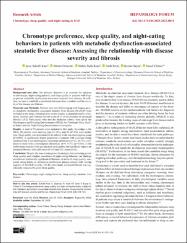Chronotype preference, sleep quality, and night-eating behaviors in patients with metabolic dysfunction-associated steatotic liver disease: Assessing the relationship with disease severity and fibrosis
Citation
Kani, A. S., Ozercan, A., Kani, H. T., Eren, F., Sayar, K., & Yilmaz, Y. (2023). Chronotype preference, sleep quality, and night-eating behaviors in patients with metabolic dysfunction-associated steatotic liver disease: Assessing the relationship with disease severity and fibrosis. Hepatology forum, 4(3), 123–128. https://doi.org/10.14744/hf.2023.2023.0034Abstract
Background and Aim: Our primary objective is to examine the variance
in chronotype, night-eating patterns, and sleep quality in patients with biopsy-proven metabolic dysfunction-associated steatotic liver disease. In addition, we aim to establish a correlation between these variables and the severity of the disease and fibrosis.
Materials and Methods: Patients who were following up with biopsy-proven metabolic dysfunction associated steatotic liver disease (MASLD) were
included in the study. Histologically severe disease is characterized by a Steatosis, Activity, and Fibrosis activity score of ≥3 or the presence of advanced
fibrosis (≥F3). Participants who met the inclusion criteria were given the
Morningness and Evening Questionnaire (MEQ), the Pittsburgh Sleep Quality Index, and the Night Eating Questionnaire to complete.
Results: A total of 93 patients were included in this study. According to the
MEQ, 48 patients were morning type (51.6%), and 42 (45.2%) were neither
type. Sleep quality was determined to be inferior in the non-morningness group
(p=0.002). A significantly higher proportion of patients with nocturnal eating
syndrome had a non-morningness chronotype preference (n=22, 23.7%), compared to those with a morningness chronotype (n=9, 9.7%) (p=0.001). In the
multivariate analysis, both age and poor sleep quality had significant impacts on
advanced fibrosis, with odds ratios of 1.11 and 3.81, respectively.
Conclusion: Despite the non-morningness chronotype demonstrating poorer
sleep quality and a higher prevalence of night-eating behavior, our findings
revealed no statistically significant differences in terms of sleep quality, nocturnal eating habits, or chronotype preferences among patients with varying
degrees of MASLD severity. On the other hand, advanced fibrosis was significantly impacted by poor sleep quality


















